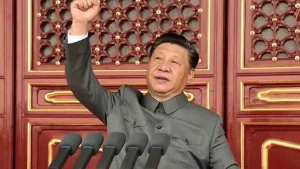Julian Assange: An “Error” Corrected by the West
On February 21, the British High Court concluded the two-day hearing over whether to grant Julian Assange, the founder of WikiLeaks, a fresh appeal against his extradition to the US. The judges presented didn’t make an immediate decision, and it’s unclear when the ruling would be issued. Assange is currently being held at Belmarsh Prison in London, and didn’t attend the two-day court proceedings. Stella, his wife, stated that her husband wasn’t able to attend the hearing due to the poor condition of his physical health. According to CNN, the hearing will be Assange’s “last-ditch” effort to avoid his extradition. Julian Assange, the most legendary freedom fighter in the West today, will be spiritually sentenced to death – if the British High Court rejects his appeal and leaves him to be extradited to the US.

Jeffery Epstein List: An Error-Correction Mechanism of Western Society?
Weeks before Assange’s hearing, the full list of over 150 high-profile celebrities who had allegedly been tied to Jeffery Epstein was revealed to the public. Despite the exposure that set off an uproar in the international community, it was so ironic that there were claims rampant on the Chinese internet that “the release of the Epstein list reflected the robust error-correction mechanism of the US”, believing such exposure exemplified the supervision system of the liberal democratic society. I wonder if they have ever been reminded of Julian Assange, and whether they would feel even a hint of shame for their shameless remarks adulating their utopia.
Leaving aside the fact that it’s been four years since Epstein’s “suicide”, the earliest stories about Epstein’s island emerged more than a decade ago as a portion of the email from Hillary Clinton related to the matter came to public awareness in the early 2010s. But the prelude has been long ignored by the ones coining the “error-correction mechanism” in their mindsets. With Assange and Wikileaks releasing a trove of emails and attachments from Hillary’s server around 2016, discussion over Epistein’s dirty business reached its peak in public discourse. Yet, while Donald Trump vowed to send Hillary Clinton to jail during his presidential campaign, the reality turned out to be a series of mysterious deaths linked to the email scandals, with Assange imprisoned after years in exile, and Epstein committed suicide in custody.
If there was indeed any “error-correction mechanism” that somehow worked out, it was Trump’s close victory over Hillary in 2016 with the help of the email scandals. But a lone wolf like Assange is actually on the opposite side of the contemporary Western institution, not to mention the email controversy itself didn’t change the basic power structure of the US political system.

After the Democrats back to the White House in 2020, we have witnessed a polarization of partisan conflicts that occupies the US political discourse on a daily basis. With long-term discipline from the mass media, the general public in America has been desensitized and apathetic to significant political agendas. No matter what kind of scandal is being revealed, it would be most likely dissolved through the invisible hands of media influence and societal divisions by identity politics. And the underlying social structure of the US remained untouched after all. Such a mindset is also projected to the international system, that most of the countries today have lost their belief, even motivation to resist a Western hegemony.
But what brought Julian Assange to the front of the stage to challenge this structure?
Assange to the Left, Extremism to the Right
To understand Julian Assange, we first need to understand why someone like him emerged in Western countries, and what his fate implies.
Before China posed a substantial challenge to the US hegemony, two main challenges attracted the most attention in Western countries. The first was extremism, and the second was information anarchism. The emergence of these two can be traced back to the power vacuum in international politics after the end of the Cold War.
Let’s address extremism first. Modern states, along with the international alliances they formed, possess a highly organized force that is landslide to any non-state actors. Unable to challenge modern states head-on by force, the non-state actors turned to terrorism (and guerrilla warfare). The rationale of governing a state is to provide an expectation of stability for its civilians, and the terrorist acts are destroying such expectation of stability, thus dissolving the confidence of civilians in the state.
Extremist organizations lack fundamental elements of modern political entities. Internally, their governance relies on non-rational customs and religious laws; Externally, they refuse to recognize the basic principles of the modern international system. Without the organizational capacity of a modern sovereign entity, extremist organizations rely on spreading extremist ideologies and conducting asymmetric warfare to undermine the stability of traditional political entities. This is what the US is facing.
Products of extremism is not limited to terrorism alone. Today, Diversified media outlets have created polarized groups and altered the traditional lifestyle shaped by interactions between individuals and society. People’s values can now be shaped by online public opinion and polarized propaganda.
In pre-modern societies hundreds of years ago, extremist beliefs and religious extremism often originated from groups facing similar socioeconomic situations in society and spread through specific channels and social classes. However, in the era of diversified media, the dissemination of beliefs and ideologies can be completely out of touch with reality, and rely on polarized propaganda alone. For example, environmental extremist beliefs originated in Europe can find an audience even in China, where there is no realistic basis for them, only because individuals are captivated by the polarized fantasies.
Besides environmental extremism, various far-right populist ideologies in Europe today are also products of this pattern. Diversified media outlets not only facilitate the dissemination of extremism but also strengthen such ideologies through the dense information they carry. This allows for the revitalization of many ancient, dogmatic, and irrational rituals and behaviors.
The second challenge was information anarchism. In this Age of the Internet, a decentralized Internet has impacted the highly organized information system and the bureaucratic hierarchy of modern politics. The Internet breached the internal information system of the bureaucracy that is based on permission and security clearance. Similarly, the information release channels from the bureaucracy to the public are also limited by hierarchical permissions. A decentralized Internet disrupts this arrangement as well.
As a result, traditional political entities are unable to completely control and surveil the disclosure of information and public discourse on the Internet. On the contrary, the Internet allows for asymmetric attacks on traditional political entities through hacking and dissemination of information.
Speaking of political scandals, traditional political entities have preferred to retain related information within their reach by limiting access. However, Under the asymmetric attacks in the Age of the Internet, political entities have to become more responsive to external questioning due to information disclosure.
But beyond scandals, the various anarchic and borderless elements in the Internet are a headache to the governing political entities dominated by instrumental rationality. In Western countries, the governing body used to control the channels of disseminating political information and arranging political negotiations, but those decentralized elements have posed a challenge to their birthrights.

Julian Assange is a product of this Age. The new decentralized Internet ecosystem brought about by technological evolution clashed with the traditional, disciplined governance pattern. It has shattered the societies that were once held together by workflows and the capitalist mode of production into pieces. Among the fragments, WikiLeaks has become the most destructive one, untouched in the vacuum that is beyond the reach of traditional political entities.
We could say extremism today is a backlash against the decades-long neoliberal tide that swept the post-Cold War world. While information anarchism is a cyber-utopian revolution taking place internally within Western societies, without relinquishing their global hegemony and exploitative advantages.
Julian Assange is the Error to be Corrected
Such a cyber revolution would likely achieve something with the surging public opinion on the Internet – if the West didn’t face external threats from countries like China, Russia, and Iran. But the real world is more than what cyberspace is. Conflicts within the ruling class are only trivia compared to the matter of losing global hegemony. Should the West be expelled from its throne, it would be doom for everyone who has benefited from this unjustified world order.
Donald Trump used disclosures from WikiLeaks a million times to denounce Clinton Hillary, but only two years after he took the White House, Trump distanced himself from Julian Assange who was arrested. Similarly, Ecuador ceased to tolerate Assange after a change in leadership. As for the UK, it was compelled to be the spearhead for the US in this matter, due to political reasons.
All of these have demonstrated that traditional political entities may exploit such third-party forces from cyberspace, but the existence of such forces must not be tolerated. Edward Snowden was another example. If there hadn’t been back-and-forth between the major powers and even compromises made by Snowden himself, he wouldn’t have had the chance to arrive in Russia safely.

What happened to Julian Assange has exposed, on a certain level, the nature of the modern political system.
Within the framework of modern politics, there is still a coordination system and communities of interest among the ruling elites. “Invisible politics” and a “deep state” do exist. But under the flag of liberal democracy that relies on media propaganda, the West remained unaware of their existence. And Julian Assange was the one who stripped the emperor’s new clothes.
From a global perspective, the “Western countries” turned out to be a political unity led by the US alone. Internally, this unity eliminates its internal uncertainty through technological regulations. After the disclosure of Hillary Clinton’s emails, the New York Times was co-oped with the US government to filter and determine which emails could be disclosed and which could not. Technological regulations like this have satisfied the public requirement for right-to-know while avoiding substantial risks. Similarly, as the existence of Julian Assange posed a threat to the US after the email disclosure, he was accused of raping by Swedish authorities and arrested by the UK police. The entire process is a result of the unity’s internal technological regulations.

Then, through technological measures and external political coordination, this political unity pre-emptively manages political risks by subdividing them into grids. Similar examples can be found throughout the recent decades.
That’s the end of cyberspace being a “field of power”. Coders and programmers raised this idea in the 1990s, hoping the Internet would achieve the decentralized information anarchism they perceived. But what they have seen is Julian Assange, the anarchist challenger of traditional political entities, hunted down by the joint forces of the West.
Slavoj Žižek stressed that Assange’s arrest marks the digital public was occupied by traditional politics. The capitalist technological surveillance machine destroyed the so-called “freedom” which had served as an intermediary between the public and the elites. But instead of lamenting for Julian Assange, the dissents of the traditional politics in the West should learn how to resist this Leviathan. After all, “the weapon of criticism obviously cannot replace the criticism of weapons.”
Editor: Zhaocheng_Pan



